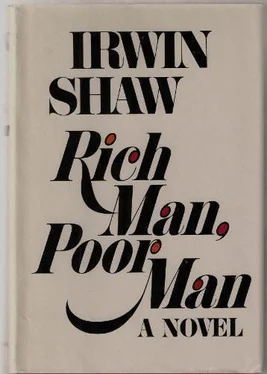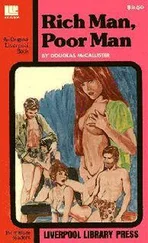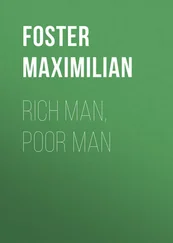Her torment began on her wedding night. In the second-class hotel in Niagara Falls (convenient to Buffalo). All the fragile hopes of the timid, rosy, frail young girl who had been photographed smiling in bridal white beside her unsmiling, handsome groom just eight hours before disappeared in the bloodstained, creaking Niagara bed. Speared helplessly under the huge, scarred, demonically tireless, dark, male body, she knew that she had entered upon her sentence of life imprisonment.
At the end of her week of honeymoon she wrote a suicide note. Then she tore it up. It was an act she was to repeat again and again through the years.
During the day, they were like other honeymooning couples. He was unfailingly considerate, he held her elbow when they crossed the street, he bought her trinkets and took her to the theatre (the last week in which he ever showed any generosity to her. Very soon she discovered she had married a fanatical miser). He took her into ice cream parlours and ordered huge whipped cream sundaes (she had a child’s sweet tooth) and imiled indulgently at her like a favourite uncle as she spooned down the heaped confections. He took her for a ride on the river under the Falls and held her hand lovingly when they walked in the sunlight of the northern summer. They never discussed the nights. When he closed the door behind them after dinner it was as though two different and unconnected souls swooped down to inhabit their bodies. They had no vocabulary with which to discuss the grotesque combat in which they were engaged. The severe upbringing of the Sisters had left her inhi-bited and full of impossible illusions of gentility. Whores had educated him and perhaps he believed all women who were worthy of marriage lay still and terrified in the marriage bed. Or perhaps he thought all American women.
In the end, of course, after months had passed, he recognized that fatalistic, lifeless rejection for what it was, and it enraged him. It spurred him on, made his attacks wilder. He never went with other women. He never looked at another woman. His obsession slept in his bed. It was her misfortune that the one body he craved was hers and was at his disposal. For twenty years he besieged her, hopelessly, hating her, like the commander of a great army incredibly being held at bay before the walls of the flimsy little suburban cottage.
She wept when she discovered that she was pregnant.
When they fought it was not about this. They fought about money. She learned that she had a sharp and hurtful tongue. She became a shrew for small change. To get ten dollars for a new pair of shoes and, later on, for a decent dress for Gretchen to wear to school, took months of bitter campaigning. He begrudged her the bread she ate. She was never to know how much money he had in the bank. He saved like a lunatic squirrel for a new ice age. He had been in Germany when a whole population had been ruined and he knew it could happen in America, too. He had been shaped by defeat and understood ihat no continent was immune. The paint was flaking off the walls of the shop for years
his prosperous, garage-owning brother came from Ohio to visit him and offered him a share in a new automobile agency he was acquiring, for a few thousand dollars which he could borrow from his brother’s bank, Axel threw his brother out of the house as a thief and schemer. The brother was chubby and cheerful. He took a two-week holiday in Saratoga every summer and went to the theatre in New York several times a year with his fat,* garrulous wife. He was dressed in a good wool suit and smelled nicely of bay rum. If Axel had been willing to borrow money like his brother, they would have lived in comfort all their lives, could have been freed from the slavery of the bakery, escaped from the slum into which the neighbourhood was sinking. But her husband would not draw a penny from the bank or put his name on a note, watched with gaunt eyes over every dollar that passed through his hands.
When Gretchen graduated from high school, although, like her brother Rudolph, she was always at the head of her class, there was no question of her going to college. She had to go to work immediately and hand half her salary over to her father every Friday. College ruined women, turned them into whores. The Father has spoken. Gretchen would marry young, the mother knew, would marry the first man who asked her, to escape her father. Another life destroyed, in the endless chain.
Only with Rudolph was her husband generous. Rudolph the hope of the family. He was handsome, well-mannered, well-spoken, admired by his teachers, affectionate. He was the only member of the family who kissed her when he left in the morning and returned in the evening. Both she and her husband saw the redemption of their separate failures in their older son. Rudolph had a talent for music and played the trumpet in the school band. At the end of the last school year Axel had bought a trumpet for him, a gleaming, golden instrument. It was the one gift to any of them that Axel had ever made. Everything else he had given to them had come as a result of ferocious bargaining. It was strange to hear the soaring, triumphant horn notes resounding through the grey undusted apartment when Rudolph was practising. Rudolph played club dates at dances and Axel had advanced him the money for a tuxedo, thirty-five dollars, an unheard-of outpouring. And he permitted Rudolph to hold on to the money he earned. ‘Save it,’ he said. ‘You’ll be able to use it when you get to college.’ It was understood from the beginning that Rudolph was going to college. Somehow.
She feels guilty about Rudolph. All her love is for him. She is too exhausted to love anybody but her chosen son. She touches him when she can, she goes into his room when he is sleeping and kisses his forehead, she washes and irons his clothes when she is dizzy from fatigue so that his splendour will be clear to all eyes at every moment. She cuts out hems from the school newspaper when he wins a race and pastel his report cards neatly in a scrap book that she keeps on her dresser next to her copy of Gone with the Wind.
Her younger son Thomas and her daughter are inhabitants of her house. Rudolph is her blood. When she looks at him she sees the image of her ghostly father.
She has no hopes for Thomas. With his blind, sly, derisive face. He is a ruffian, always brawling, always in trouble at school, insolent, mocking, going his own way, without standards, sliding in and out of the house on his own secret schedule, impervious to punishment. On some calendar, somewhere, disgrace is printed in blood red, like a dreadful holiday, for her son Thomas. There is nothing to be done about it. She does not love him and she cannot hold out a hand to him.
So, the mother, standing on swollen legs at the window, surrounded by her family in the sleeping house. Insomniac, un-fastidious, overworked, ailing, shapeless, avoiding mirrors, a writer of suicide notes, greying at the age of forty-two, her bathrobe dusted with ash from her cigarette.
A train hoots far away, troops piled into the rattling coaches, on their way to distant ports, on their way to the sound of guns. Thank God Rudolph is not yet seventeen. She would die if they took him for a soldier.
She lights a last cigarette, takes off her robe, the cigarette hanging carelessly from her lower lip, and gets into bed. She lies there smoking. She will sleep a few hours. But she knows she will wake when she hears her husband coming heavily up the steps, rank with the sweat of his night’s work and the whiskey he has drunk.
The office clock stood at five to twelve. Gretchen kept typing. Since it was Saturday, the other girls had already stopped working and were making up, ready to depart. Two of them, Luella Devlin and Pat Hauser, had invited her to go out and have a pizza with them, but she was in no mood for their brainless gabble this afternoon. When she. was in high school she had had three good friends, Bertha Sorel, Sue Jackson, Felicity Turner. They were the brightest girls in the school and they had made a small, superior, isolated clique. She wished all three of them or any one of them were in town today. But they all came from well-off families and had gone off to college and she had found no one else to take their place in her life.
Читать дальше











